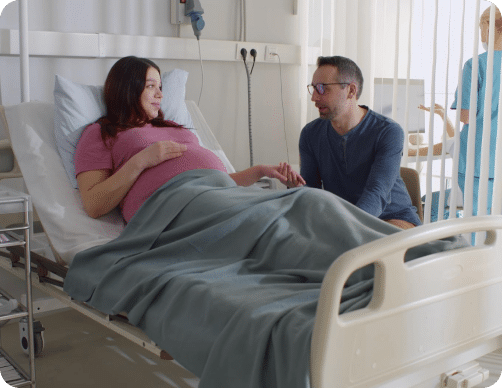Prenatal Care
Prenatal Care Instructions & Tests
Prenatal Care is a very important part of having a normal healthy baby. Prenatal visits help us diagnose and intervene as needed as early as possible. We encourage you to become active in your care and keep a list of questions or concerns.

First Trimester
(0-12 Weeks)
- Ultrasound: Vaginal ultrasound to establish due date.
- Routine Tests: Bloodwork to check for infections and conditions like HIV, hepatitis, and syphilis.
- Physical Symptoms: Common symptoms include nausea, vomiting, and breast tenderness. Relief measures will be discussed.
Second Trimester
(13-28 Weeks)
- Fetal Heartbeat: Heard around 12 weeks, and checked at each visit.
- Feeling Movement: You will start feeling the baby move around 18-20 weeks.
- Ultrasound: Performed around 20 weeks to check organ development.
Third Trimester
(29-40 Weeks)
- Fetal Growth: Most growth happens in the last trimester.
- Important Decisions: Discussions will cover anesthesia, breastfeeding, and choosing a pediatrician.
- Labor Prep: Around 36 weeks, we’ll discuss labor and delivery, and provide guidance on packing for the hospital.
Baby Birth Plan
During Labor
- Enema: Optional, available upon request.
- Shave/Prep: Not required unless a Caesarean section is necessary.
- Oral Intake: Ice chips, hard candy, and popsicles are allowed.
- IV: Essential for administering antibiotics, pain medication, epidurals, or fluids.
- Activity: During early labor, you may move around or take walks. Nurses will guide you through helpful movements.
- Monitoring: Baby’s heart rate and your contractions will be monitored continuously in active labor.
- Pain Relief: Options include relaxation techniques, IV pain medication, and epidurals.
Delivery
- Pushing: You can choose between various positions such as lying down, squatting, or kneeling. Nurses will guide you through the best options.
- Episiotomy: Only performed if necessary to prevent excessive tearing.
- Forceps or Vacuum: Used only in special cases like slow baby heart rate or difficult delivery.
After Delivery
- Breastfeeding: Encouraged within the first hour after birth, while babies are most alert.
- Newborn Care: Baby will be taken to the nursery for admission, typically two hours after birth.
- Postpartum Care: You will be transferred to the postpartum unit where you can stay for 24 to 48 hours, depending on delivery type and insurance.
What to Bring to the Hospital
Insurance cards, pediatrician’s name, and a list of known allergies.
Personal items for comfort: supportive bras, loose clothing, and baby outfits.
Essentials: camera, music, chapstick, and change for vending machines.
Tests During Pregnancy
- Blood Pressure: Checked at every visit.
- Urine Test: Monitors protein or glucose levels.
- Fundal Height: Measures uterine growth.
- Ultrasound: Performed after 7 weeks to evaluate the baby’s development.
- Glucola Test: Screening for gestational diabetes, performed around 28 weeks.
Dietary
Dietary Recommendations for Pregnancy
Proper nutrition is key to a healthy pregnancy. Below are essential dietary guidelines to help you get the nutrients you and your baby need during this important time.


General Food Safety Tips During Pregnancy
Maintaining food safety is essential for you and your baby’s health. Here are some important precautions to take:
- Use hard cheeses like cheddar instead of soft cheeses. If consuming soft cheeses, ensure they are cooked until bubbling.
- Eat only thoroughly cooked meat, poultry, and seafood.
- Reheat deli meats for at least 20 seconds in the microwave.
- Avoid fish with high mercury levels, including shark, swordfish, king mackerel, and tilefish.
- Stay away from raw sushi and fish from lakes or rivers with potential pollutants.
- Wash all fruits and vegetables thoroughly before eating.
- Avoid raw eggs, including raw cookie dough, tiramisu, Caesar dressing, and homemade ice cream.
- Limit caffeine to no more than 8 ounces per day.
- Vegan Diets: Ensure your diet includes enough protein, vitamins B and D, calcium, zinc, and iron. Vitamin B12 can be obtained from fortified soy milk or supplements.
- Drink 10 eight-ounce glasses of water daily.
Weight Gain Guidelines
The average recommended weight gain during pregnancy is 25 pounds, though this may vary based on your pre-pregnancy weight or if you’re expecting twins.
Prenatal Vitamins
You will be given various prenatal vitamins to try. If you experience discomfort or nausea, you may use two children’s vitamins (such as Flintstones) during the first trimester, but aim to return to prenatal vitamins as soon as possible. If prenatal vitamins continue to make you sick, try taking them at a different time of day.
Discomforts
Managing Common Discomforts of Pregnancy
Pregnancy brings many changes to the body, and with it, certain discomforts. Below are common issues that may arise and recommendations on how to manage them safely during pregnancy.

Breast Tenderness
- Solution: Wear a well-fitting support bra.
- Medication: You can take Tylenol for relief.
Nausea
- Over-the-Counter (OTC) Options: Unisom Nighttime Sleep Aid or Emetrol (follow bottle instructions).
- Home Remedies: Crackers, toast, soup, or broth; try peppermint or cinnamon candy.
- Diet: Eat small, regular meals every 2-3 hours. If your prenatal vitamins cause nausea, try changing the time of day you take them.
Vomiting
- Diet: Start with clear liquids (popsicles, jello, Sprite, Gatorade). Gradually move to soups and solid foods. If vomiting resumes, return to clear liquids.
- Doctor’s Advice: If vomiting continues for more than 24 hours or is accompanied by fever, contact your doctor at (865) 524-3208.
Nasal Congestion
- Remedy: Increase fluid intake and use saline nasal drops 2-3 times a day. Vaporize your home to reduce congestion.
Headaches
- Medication: Tylenol (Regular or Extra Strength).
- Doctor’s Advice: If headaches persist and are accompanied by blurred vision or swelling in the hands, face, or feet, call your doctor.
Nosebleeds
- Remedy: Pinch the nose and hold for 5-10 minutes. Applying ice to the back of your neck can help. Nosebleeds are more common due to increased blood volume during pregnancy.
Dizziness
- Preventive Measures: Stand up gradually, avoid skipping meals, drink plenty of fluids, and avoid hot showers. If dizziness occurs more than twice a week, notify your doctor.
Colds or Sinus Problems
- Remedy: Increase fluid intake and use saline nasal drops 2-3 times a day. If symptoms include fever or colored nasal discharge, contact your doctor.
Sore Throat
- Remedy: Gargle with warm salt water and use Tylenol as needed. You may also use Cepacol, Chloraseptic Spray, or Lozenges.
Constipation
- Remedy: Increase dietary fiber (fruits, vegetables, bran) and fluid intake.

Approved Medications During Pregnancy
Important Notes
Medications to Avoid: Do not take NSAIDs like Motrin, Advil, or Aleve as they may cause birth defects. Consult your doctor or nurse before taking any additional medications.
For any concerns about medications or symptoms during pregnancy, please contact our nurse or your physician for guidance.
Early Labor/False Labor (Braxton Hicks)
- Occasional Contractions: May experience 3-4 contractions in an hour.
- Decrease Activity and Increase Hydration: Try Tylenol for discomfort.
- No Need to Time Contractions: Unless they are significantly painful.
- Blood-Tinged Mucus:
- Can occur with false labor, early labor, and post-intercourse.
- Normal but come in for evaluation if there is significant bleeding or concern.
- Fluid Leakage:
- Sudden gush or constant trickling down the leg; signs of amniotic fluid leaking out.
- Proceed to the hospital for evaluation, even if no contractions or irregular.
Painful Contractions 5-7 Minutes Apart for an Hour:
- Proceed to the hospital for evaluation.
- Will be monitored at the hospital; may be offered pain medication if not in active labor.
- If not in active labor, be prepared to be sent home depending on gestational age.
When to Call
Where to Go
- Fort Sanders Regional Medical Center: Follow signs to the Emergency Department.
- Labor and Delivery Triage Department: You will be checked in there and taken up to this department.
- Evaluation: You will be evaluated by a registered RN who is in communication with the physician on-call.
- Observation: You may be observed for over an hour or more to assess where you are in your labor course.

Changes Around 35 Weeks
- Your body begins to prepare for labor and delivery, and you will likely start experiencing some changes.
- You don’t need to come to the hospital until the contractions are painful and every 5-7 minutes for over an hour (depending on your distance from the hospital).
- You may have a run of regular contractions for 30-45 minutes that then dissipate spontaneously. This is normal and is a sign of your body preparing for birth. Your body can do this intermittently for several days prior to the onset of active labor.

Kick Counts at 28 Weeks
- Start doing daily kick counts.
- If the baby’s movement is decreased, we recommend lying down and having a snack and hydration.
- If the movement does not increase over the next hour or so, we recommend you go to the hospital for evaluation to assure the baby is not in distress.
- On average, babies move 10 times every two hours.

Who to Call
One of our physicians is on-call at all times for emergencies, 865-524-3208.
Please note, the on-call physician is limited in the amount of medical advice that can be given over the phone without an evaluation. The triage department at the hospital is available at all times to assist in properly evaluating and caring for women during this time.
Routine Postpartum Care
- No Lifting >10lbs: Nothing in the vagina, pelvic rest. Start doing Kegels and deep core exercises.
- Discuss with Provider: Regarding pelvic PT. If still in pain after Ibuprofen and Tylenol, take the stronger pain medication.

Perineal Care
- Sitz Baths: At least 2x daily for 10-15 min.
- Warm water or can add Herb Lore or other brands of perineal soaks.
- Witch Hazel Ice Pads: Recommend making prior to delivery.
- Perineal Ice Packs
- Tylenol and Ibuprofen Scheduled
- Peri-bottle
- Tucs pads
- MiraLAX, Metamucil or Dulcolax
Perineal Cesarean Section
- Tylenol and Ibuprofen Scheduled
- MiraLAX, Metamucil or Dulcolax- daily
- Massage scar daily
- Desensitization of scare with manipulation
- Recommend rolling to side to get out of bed – your abs will be very sore and will not assist with movement as before surgery
